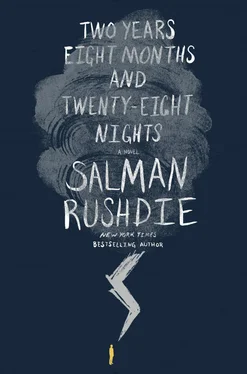Pillows. Sheets.
The bed took his weight, the pocketed springs of the mattress sighing a little beneath him like a second lover, and then he felt her weight come down on him too, as the law of gravity reasserted itself. When he understood what had happened he began to weep, though he was not a man who found it easy to cry. She came off him and held him but he was unable to stay lying down. He climbed out of bed, gingerly, still half in disbelief, and allowed his feet to move towards the bedroom floor. When they touched it he cried out. Then stood, almost falling at first. His legs were weak, the muscles softened by lack of use. She stood beside him and he put an arm around her shoulder. Then he steadied, and released her, and was standing by himself. The room, the world, fell back into its familiar and long-lost shape. He felt the weights of things, of his body, his emotions, his hopes. “It seems I must believe you,” he marveled, “and that you are who you say you are, and Fairyland exists, and you are its most powerful sorceress, for you have broken the curse that was laid upon me and rejoined me to the earth.”
“What is more extraordinary than that,” she rejoined, “is that, although I am indeed who I say I am, not only Dunia mother of the Duniazát but also the Princess Skyfairy of Qâf Mountain, I am not responsible for what has happened here, except that in our lovemaking I helped to unleash a power in you which neither of us suspected you possessed. I didn’t bring you back down to earth. You did it by yourself. And if the jinni spirit in your body is capable of overcoming the sorcery of Zabardast, then the dark jinn have an enemy to reckon with in this world as well as the other one, and the War of the Worlds can perhaps be won instead of ending, as Zumurrud and his gang believe, in the inevitable victory of the dark jinn, and the establishment of their tyranny over all the peoples of the earth.”
“Don’t get carried away,” he said. “I’m just a gardener. I shovel and plant and weed. I don’t go to war.”
“You don’t have to go anywhere, my dearest,” she said. “This war is coming to you.”
Oliver Oldcastle the estate manager of La Incoerenza heard a scream of terror coming from his mistress’s bedroom and immediately understood that what had happened to him must also have happened to her. “Now I really will kill that bastard hedge clipper,” he roared and ran barefoot to help the Lady Philosopher. His hair was loose and wild and his shirt hung out of his worn cord trousers and with his arms windmilling as he ran he was more ungainly Bluto or Obélix moving at speed than leonine latter-day Marx. He passed the boot room with its faint ineradicable odor of horseshit, galloping along old wooden floors that on another day would have delivered splinters into his pounding feet, watched by the angry tapestries of imaginary ancestors, narrowly avoiding the Sèvres porcelain vases uneasy on their alabaster tables, running with his head down like a bull, ignoring the disapproving whispers of the supercilious shelves of books, and burst into Alexandra’s private wing. At the door of her bedroom he gathered himself, smacked uselessly at his tangled hair, tugged his beard into shape, and stuffed his shirt into his trousers like a schoolboy asking for an audience with the head teacher, and “May I enter now, milady,” he cried, the volume of his voice betraying his fear. Her loud answering wail was all the invitation he needed and then they stood facing each other, mistress and servant, she in a long archaic nightdress and he in shambles, with the same horror in their eyes, which turned slowly towards the floor, and saw that not one of their four bare feet, his sprouting hair at the ankle and from each toe, hers tiny and well formed, was in contact with the floor. A good inch of air stood between them and the ground.
“It’s a bastard disease,” Oldcastle bellowed. “That superfluous growth of a person, that fungus, that weed, came into your home bearing this blighty infection, and he has transmitted it to us.”
“What kind of infection could possibly produce such a result?” she wept.
“This sodding kind, milady,” cried Oldcastle, clenching his fists. “This turfing variety, pardon my French. This Dutch elm beetle you took into your private flower bed. This fatal oak killer Phytophthora. He’s left us bloomin’ diseased.”
“He’s not answering his phone,” she said, waving her instrument uselessly in his face.
“He’ll answer to me,” said Oliver Oldcastle monumentally. “Or I’ll landscape his ill-formed rump. I’ll horticulture his savage bastard skull. He’ll answer to me all right.”
Separations of all sorts were being reported in those incomprehensible nights. The separation of human beings from the earth was bad enough. However, in certain parts of the world it had not begun or ended there. In the world of literature there was a noticeable separation of writers from their subjects. Scientists reported the separation of causes and effects. It became impossible to compile new editions of dictionaries on account of the separation of words and meanings. Economists noted the growing separation of the rich from the poor. The divorce courts experienced a sharp increase in business owing to a spate of marital separations. Old friendships came abruptly to an end. The separation plague spread rapidly across the world.
The detachment from the ground of a growing number of men, women and their pets — chocolate Labradors, bunny rabbits, Persian cats, hamsters, ferrets, and a monkey named E.T. — caused global panic. The fabric of human life was beginning to unravel. In the Menil Collection gallery in Houston, Texas, a shrewd curator named Christof Pantokrator suddenly understood for the first time the prophetic nature of René Magritte’s masterwork Golconda, in which men in overcoats, wearing bowler hats, hang in the air against a background of low buildings and cloudless sky. It had always been believed that the men in the picture were slowly falling, like well-dressed rain. But Pantokrator perceived that Magritte had not painted human raindrops. “They are human balloons,” he cried. “They rise! They rise!” Foolishly he made his discovery public and after that the Menil buildings had to be protected by armed guards against local people incensed by the great work of the prophet of antigravity. Some of the guards began to rise, which was alarming, and so did several of the protesters, the would-be vandals.
“The places of worship are full of terrified men and women seeking the protection of the Almighty,” Ghazali’s dust said to the dust of Ibn Rushd. “Just as I expected. Fear drives men to God.”
There was no response.
“What’s the matter?” Ghazali scoffed. “You finally ran out of hollow arguments?”
At length Ibn Rushd answered in a voice full of masculine complication. “It’s hard enough to discover that the woman who bore your children is a supernatural being,” he said, “without also having to bear the knowledge that she is lying with another man.” He knew this because she had told him. In her jinnia way she thought he would take it as a compliment that she had fallen for his copy, his echo, his face on another body, revealing that in spite of her love for human beings there were things about them she absolutely didn’t understand.
Ghazali laughed as only dust can laugh. “You’re dead, you fool,” she said. “Dead for eight centuries and more. This is no time for jealousy.”
“That is the kind of inane remark,” Ibn Rushd snapped back from his grave, “which shows me that you have never been in love; from which it follows that even when you were alive you never truly lived.”
“Only with God,” Ghazali replied. “That was and is my only lover, and he is and was more than enough.”
Читать дальше












